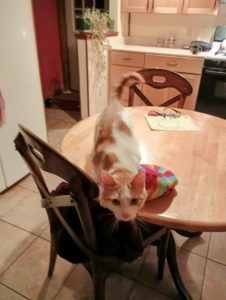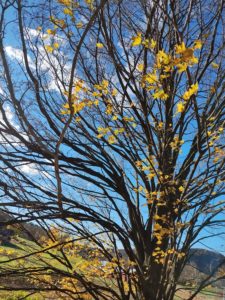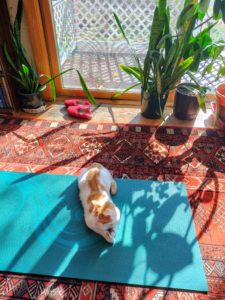Today I completed Poem #30 for the 30 Poems in November fundraiser for the Center for New Americans–a day ahead of schedule, Whew!
Since tomorrow is still November, I may attempt a final poem. Usually, I like to write a cento (a collage poem using lines from other poems) from all the poems offered as prompts over the month. That will enable me to drop a poem that’s not working when I compile my collection of 30, kind of like having the option to eliminate the lowest grade on a series of quizzes!
Of course, at this point, many of these baby poem-drafts aren’t working too well, and getting rid of only one won’t solve that problem. That’s where poem-wrestling comes in. My December writing focus will be on honing these poems into a shape I can share with those who donated to the fundraiser without being too embarrassed about them, even though most of them will still be far from my perfectionist standards.
But perhaps, part of this practice is also about being more comfortable showing my flaws in public–as I did, last weekend when I was asked to be part of the rotation of family musicians and play five minutes of background music on the piano for the appetizer hour of my nephew’s wedding celebration. I NEVER play the piano in front of other people, as those who are familiar my journey back to claiming my piano-playing past (which I wrote about in my not-yet-published memoir, Imperfect Pitch) already know. But I said yes, because I’m loyal to my family and my brother assured me no one would be listening. So, here I was, first on the list of the family players approaching the ivory among the (thank heavens) rising din of chatter. I pretended I was alone and played the pieces I’d prepared, even adding a little klezmer-inspired tune I’d composed on the spot the day before when humming to my grandchild to get him to take a nap.
I actually had fun, because I really was able to play as if I were alone in the room. And I think that’s what I’m going to have to do as I wrestle these 30 poems–pretend I’m alone in the room and see where they want to go without thinking too much about the added pressure of having to share them.
What will poem wrestling entail? Many things, but briefly–zeroing in on what the poem is really about and then thinking about whether each image builds on that or feels like a random aside. Also, looking closely at language and form: how do the words sound on the page. I play a lot with rhythm and repetition of sound patterns. I also look for places I can improve enjambments or use space more strategically.
And because I’m a perfectionist, I’m often writing 3 or 4 or 5 versions of each poem, then letting a version sit for a couple of days before reviewing it. Sometimes I’m so bemused by what I’ve done as in that funny Christine Lavin song, What Was I Thinking, I go back to an earlier version.
And as the days of December wane and my deadline for sending the poems to donors looms, like the cat hesitating at the open door, (an image in the poem I wrote today) I’ll just have to go bravely into the headwind.




 look at things differently. Even today, when I sat down to try to write Poem #9 and came up empty (so I started to write this blog post instead), I found myself intrigued by the leaves’ dance outside my window in that brilliant, but all-too-fleeting sun.
look at things differently. Even today, when I sat down to try to write Poem #9 and came up empty (so I started to write this blog post instead), I found myself intrigued by the leaves’ dance outside my window in that brilliant, but all-too-fleeting sun.